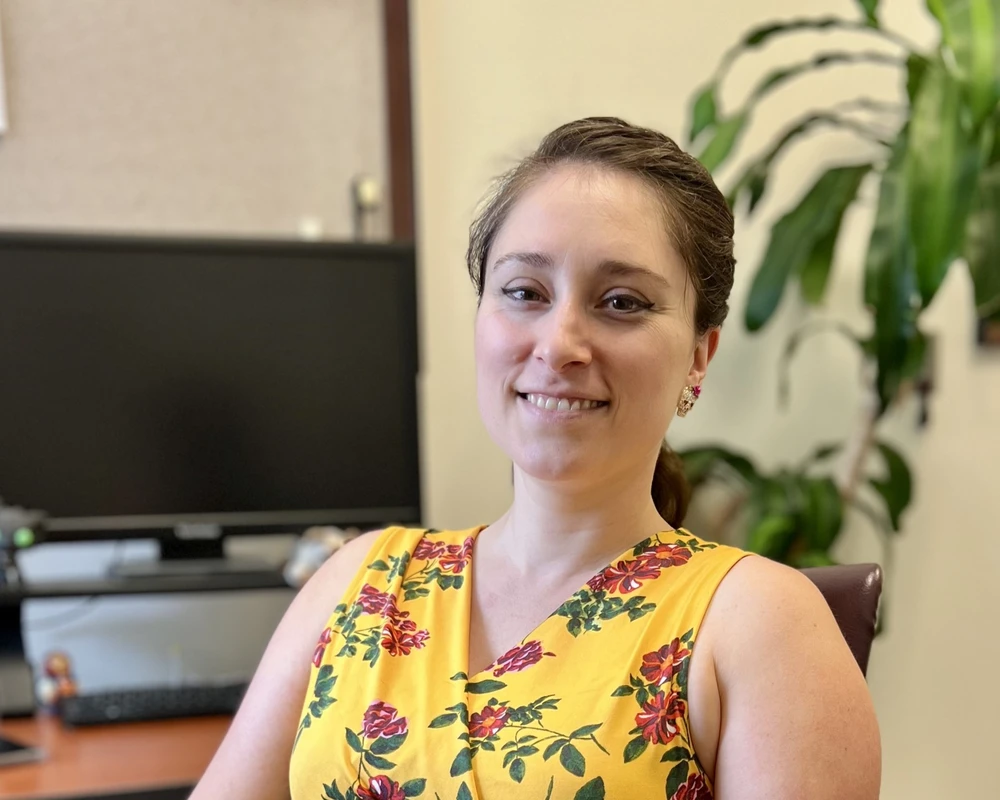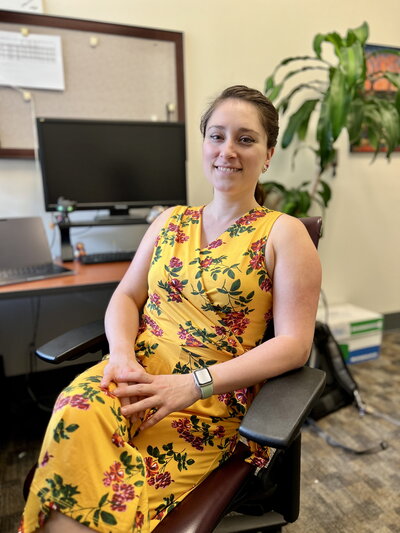

As an Illinois undergraduate, Makenna Pinkham was afraid of failing Organic Chemistry I her sophomore year, but that fear quickly faded, and she started looking forward to the 8 a.m. class taught by Jordan Axelson, director of undergraduate studies, and senior lecturer.
“Dr. Axelson did everything in her power to make the content digestible, interesting and even fun,” said Pinkham, a 2025 chemistry graduate who is now in the Neuroscience Graduate Program at Illinois pursuing her doctorate. Pinkham said organic chemistry became her favorite class as undergraduate.
“It introduced me to a subject that I didn't know I'd love as much as I do. It also ignited an interest in organic chemistry and how it can be applied to my other interests,” Pinkham said.
An Illinois chemistry alum as well, Axelson (BS, ‘10) begins her tenth year of teaching organic chemistry this fall. And for the second time, she has received a School of Chemical Sciences teaching award – the Faculty Instructor Teaching Award – that recognizes the entire scope of the educational effort of teaching, from course development to in-class instruction.
Each Fall and Spring semester, Axelson teaches CHEM 232: Elementary Organic Chemistry I to hundreds of students from a variety of majors in multiple sections of the class. In addition to chemistry majors and a smattering of engineering and other majors, her classes are full of students on pre-health educational paths to medical, dental, veterinary, and nursing careers.
Axelson said many students are apprehensive or afraid when they walk into CHEM 232 on the first day of class, because they have heard it is a really tough course.
At the beginning of each semester, Axelson asks students to share adjectives describing organic chemistry that are incorporated into a word cloud – a visual collection of words with more frequently submitted words displayed in larger text.
“Every time a word is repeated, it gets bigger in the cloud, and every semester, it’s very predictable. The biggest words are things like, challenging, scary, terrifying. Generally negative words are the biggest ones, and then there’s a couple little happy ones in there, too,” Axelson said.
She shares the word cloud on the first day of class and addresses the fact that students are feeling anxious. Then she shares her own story as an Illinois undergraduate.
“I tell them that chemistry wasn't necessarily easy for me. It was something that I had to work at. I'm standing here because I worked really hard, not because it was easy for me. I just try to show them from my personal experience that it’s okay to feel nervous,” she said.
Axelson also emphasizes to her students that the way you get better at organic chemistry is the same way that you get better at playing a sport, an instrument or a video game.
“It’s practice and the accumulation of experience that will make you better. So, it’s a lot of time and energy that you have put into the class, but you can do that like I did,” Axelson said. “And I think that resonates with some students because then I'm not this person on a pedestal who just gets it. I hope that inspires them to not be so afraid and just realize they can do the work.”
Axelson said there are challenging aspects to the class with the amount of content and type of content that’s covered, and it can feel overwhelming at times.
“But I really want my students to come out at the other end realizing how much they can learn and how much they have learned,” Axelson said. “I think 232 can be an experience that allows a student to grow and become a better student by learning how to learn and how to study better. Watching my students grow through the whole process is one of my favorite parts of teaching.”
Mya Mills, another 2025 chemistry graduate, said Axelson “made organic chemistry a blast.”
“She was an incredibly engaging and creative professor. No one else could make 8 a.m. org so enjoyable,” Mills said.
Axelson said she does her best to bring a lot of energy into her teaching, especially for those early sections.
“I’m not going to lie. Those 8 a.m. classes are just rough,” she said.
Regardless of the time of day, Axelson infuses creativity into all her organic chemistry sections, using themes to help students understand and relate to the material.
“I have certain days that are themed, and I’ll have a particular outfit that I wear or a costume,” she said. “One day is a beach day, so I come in a flowy outfit with a hat and sunglasses.”
How does organic chemistry relate to a beach?
“That’s when we’re talking about cyclohexane,” said Axelson, who was reluctant to divulge too much information and spoil the experience for future CHEM 232 students.
But basically, Axelson said, there’s a shape that a particular molecule makes that sort of resembles a chair.
“So, I kind of treat that like a beach chair,” she said.
Another day, Axelson coordinates a physical race between her and a student – blindfolded – to demonstrate chemical reaction rates and how structure impacts the rate.
“I have never won,” Axelson said. “So, I have my structure situation, and the student has their structure situation, and unfortunately for me, their structural situation is more beneficial to getting to the finish line first.”
This past academic year, an instructional video of Axelson dressed up as a wizard for another theme day went viral on social media.
“That was interesting,” Axelson said with a laugh, explaining that the popular post was followed by four consecutive days of random people, students, former students, and teaching assistants contacting her about the video clip. “I didn’t know how to feel about it. It was a positive thing, but I clearly would not do well with fame. It was funny. My parents really enjoyed reading through all the comments.”
The theme days are only part of her overall goal to incorporate activities into her teaching that are unexpected and visual.
“I also try to do as many practice problems as I possibly can just so we can do them together and students can interact with each other. Then, it’s not just me talking at them the whole time. They actually get to do something,” she said. “I hope it helps keep them engaged, so they can have a chance to apply what they’re learning.”
Axelson said one of the most rewarding aspects of teaching is seeing her students grow and do things they didn’t think they could.
“I think the best emails I get at the end of the semester are from students who talk about being so scared coming into the class, but in the end, they liked it and did better than they thought they were going to. They grew as a person with time management and organizational skills, or their confidence grew. I feel really happy when I hear that,” she said.
After nine years of teaching, Axelson said she has grown as well, because she is better at explaining the course material and has fielded enough questions in class that now she can anticipate questions and address them before students even ask.
“Like I’m psychic,” she said with a laugh.
And she has continued to try new things and retain what works. She learned during the pandemic when classes were taught remotely that the students responded very well to more structure with weekly schedules showing day by day what would be covered in class and when assignments are due. She has found that incorporating some flexibility into assignment deadlines works well too.
“I’ve been teaching it long enough that I’ve been able to figure out ways to provide that extra flexibility or that extra accommodation. Organic chemistry is stressful enough, so how can we alleviate some of that anxiety and stress,” Axelson said.
After graduating from Illinois, Axelson moved on to the University of California-Berkeley, completed her Ph.D. and then returned to her alma mater.
“I just got really lucky,” Axelson said about landing a teaching position at Illinois. “I’m really happy that I get to teach organic chemistry. And I feel very lucky that I get to teach a class that I really enjoyed as a student.”